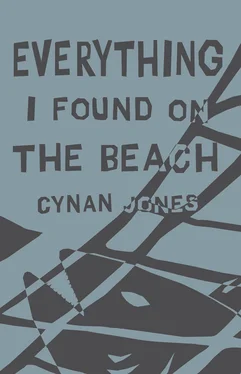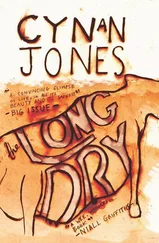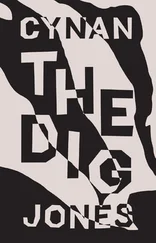“ Mam nadzieję, ż e nie gniewasz się za bardzo .” I hope you’re not too angry, he thought, about his wife.
The skin-headed Pole was up front with the crew and the pilot and one of the older men among them, in the back, spoke carefully.
“The throttle will be in your hand, like a motorbike.” He showed them surreptitiously on the motor by his legs. “That’s forward and reverse. That lever there. And those are the gears.”
The other men watched. They glanced now and then at the pilothouse and rode up and down with the boat.
“The sea will push you left, right, and center,” said the man. “You just have to keep correcting. Follow the nose of the compass. You’ll work out soon enough, but it goes the opposite way.” He shifted the tiller from side to side, looking up at the pilothouse. “It’s like reversing a trailer,” he said, “it goes the opposite way to your steer.”
Every now and then the boat seemed to be making harder work through the water but when the man came out to talk to them about what would happen now they seemed to be idling. Grzegorz was sure they were headed in circles. The cold had begun to bite them, even through the big puffer jackets they had. Grzegorz looked at his phone for the time. Harry spoke to him.
“ Nie ma tutaj zasięgu .”
“Nor me,” said Grzegorz. “I don’t have a signal either.”
The men watched in the trawler as the lights of the plane showed and heard the radio confirming the drop and saw the plane go over and the dark mass drop into the water. They rode the trawler to it and helped lift in the mass with gaff hooks by the netting it was covered with, and they stood back and watched the crew open the package and tear off the layer upon layer of hessian and polyethylene and watched as they measured the pack into smaller packages. It seemed to take forever.
As he watched, Grzegorz thought of his wife and the two sons and of the new life he could make with the ten thousand he would be paid.
They inflated the boats that were tied to the trawler and the generator on the boat was extraordinarily loud. They fitted on the motors with the heavy fuel tanks and extra fuel and took the packages they were given, and three miles from shore headed in to the different landing points they were allocated.
Most of the Poles had lied about handling a boat before. It was testament to the quality of their lies that they were entrusted with the packages. But then, there was the surety of their families. At the time Grzegorz was inflating the boat, his wife was up with their child who couldn’t sleep and was asking for him.
They had electronic compasses and they had been pre-set to give the men bearings.
The men dispersed in the water and the trawler went off and there in the dark Grzegorz’s compass failed. It was as simple as that. The software just froze.
He seemed to go for hours, hopefully. He headed the boat at the line of lights he could see way off in the distance, taking them to be the coast, but they were the scallop boats and when he had realized and turned away he was totally disoriented.

Hold drove to Cara’s and looked at the house. He knew she was at work. He looked at the knife on the front seat, some talisman, and said to himself that it would be enough. It brought some sense of something else to this.
He got out from the van with the box and took the key from its hanging place and went into Danny’s shed. He saw the ambergris cutting, pinned up, faded, the triumphant men who had found it beaming from the picture, Danny’s outside “maybe.”
“What would you have done with this?” he said. “Your ‘maybe’ came in.”
He pushed the box of his things in at the back of a high shelf among rusted tins of paints and boat varnish. “That’s me,” he thought. “They can do what they like to the trailer now. I don’t care about anything else.”
He got back in the van. The new plastic of the cooler stank on the passenger seat. He’d stopped for money and the roll of notes was curled up in the driver’s doorwell. The phone was on the seat next to the bag and the in-car charger went umbilically from it to the lighter socket. “Make sure you’re near the phone. Get to the port. Wait.” Those were his instructions.
He looked at the rabbits in the bag and he thought of the man and he heard repeated the harrowing pleading of the woman’s voice and thought of Cara sleeping in the room next to the boy that night and it was as if only then he truly acknowledged that he had left one world. That how things had been would never come back to him. Things went cement just then. He looked out behind the house at the rising light.
He looked at the map, traced the red and green lines. “Straight line,” he said to himself. “It’s just a straight line now.”

The big Irishman stepped outside the pub and set his pint down on the sill and started methodically to roll himself a cigarette. It was a process that looked incongruous for him with his huge hands and yet he was deft at it and there was something almost childlike about it. It was barely midmorning but a noise spilled out of the pub already.
The big man was about to light up when another man came out of the door with a phone in his hand looking for the big man. He gave the big man the handset and said, “Call…” just to say something and the big man waited with his hand over the mouthpiece until the man, who was the barman, had gone back inside. The phone looked like a toy in his hand.
“Yeah?”
Two other men were coming outside for cigarettes with pints in their hand and the big man looked at them and they nodded and went back inside.
“It’s Stringer.”
“Stringer.”
“We’ve had the call.”
The big man waited for Stringer to talk things through. He listened while Stringer gave him the details, then he took the phone back into the pub.
Stringer had got the call first thing.
“No connection,” the man had said. “Everything will be waiting for you, the usual way.” There was the hint of scouse accent.
“The taxi driver?”
The man made an affirmative noise down the phone.
“You want it quiet?” Stringer asked.
“No. Send a message.”
“How loud?”
“Very loud.”
Stringer understood.

Hold drove north. He tried to focus but he was dogged with thought. He heard the child’s voice on the phone, the almost bird-like greeting of tata . He had a picture of how old the boy was from the phone and hoped he was too young for this thing to register. He knew absolutely how it would be when tata did not come home.
His mother had drunk in darker moods before his father left, but it took a real grip once he went. It took Hold years to piece together the damage of that abandonment but as a child it washed over him straight away. His father simply didn’t come home one day. All his mother’s emotions seemed to collapse in on themselves; and while they moldered inside her, the fruits of the fungus came out as great spores of blame. The abandonment somehow affected her worse than all his father’s brooding moods. She blamed herself for not being able to lift them off him.
Hold was just at the wrong age. He was at the age where the sight of his mother in despair set off some heroism in him.
He wanted to be like Danny’s father. He had strange mixed-up feelings of relief that his father had gone, but he could not help the anger at the rubble it left of his mother and he dealt with that as he had learned to deal with everything else by then: to package things up tightly, to make a small solid thing of himself, something solid enough to support things.
Читать дальше













